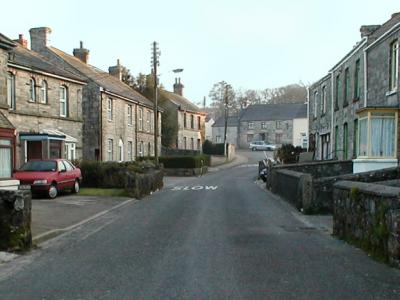


The clay workers village
Web: www.stdennis.org.uk
The village of St. Dennis is situated on the B3279 between Newquay and St. Austell. The village had a population of 2,810 at the 2011 census. A quarter of the male population is employed in the china clay industry. The village is famous for its church built on the site of an Iron age hillfort. Other major buildings include the Methodist chapel and the Boscawen Hotel.
St. Dennis originated as several smaller settlements: Hendra, Trelavour and Whitepit. The area's population grew rapidly after William Cookworthy discovered china clay in the area in 1768.
The area is characterised by tips and pits of china clay mining but St. Dennis village itself is designated an 'island settlement' which prevents encroachment by the china clay industry. Much of the parish is up to 500 feet above sea level, and the countryside is moorland with small fields enclosed by earth-covered granite walls known as 'hedges'. These hedges were constructed centuries ago, when the land was cleared for farming.
The church is situated on top of a hill overlooking the village and has views over Goss Moor to the sea at Newquay. It was dedicated to St. Denys in 1327 and stands on the site of an Iron Age fort. The tower is the oldest part of the church, and the newer church was almost destroyed by fire in 1985. Although heartbreaking at the time, it has risen again from the ashes. The new roof timbers were so large that they had to be lifted in by a helicopter.
The village also has a strong history of Methodism and at one stage there were three Methodist chapels in the village. Of these three, Carne Hill is the only chapel which is still open to this day.
Over the years the China Clay and stone industry was serviced by a railway passing through the edge of the village and a mineral junction to the west of the village bore the village name, St. Dennis Junction. The railway and the station closed in 1960.
During the late 1980's and 1990's however, the china clay industry began to decline. In its heyday the village enjoyed many different shops including a Co-op store, several hairdressers (both men and ladies), four petrol filling stations and car repair workshops, two schools, two GP surgeries, chemist, fire station, blacksmiths, coal-yard, two pubs, cobblers, two fish and chip shops, two bakeries, two chapels, post office, undertaker, launderette, furniture showroom, working men’s club, band club, football club and the Plaza Cinema. Sadly many of these have now closed, the Plaza closing its doors and being demolished in 1964. The village Post Office closed on the 8th April 2015.
The infant school in St. Dennis has been amalgamated with the new primary school, and the old building has been refurbished and is now used as an outreach centre called ClayTAWC.
St. Dennis Band is based in the village, and has a history of competing with some of the world's top bands. The Band recently gained Championship Status in 2009. The village has three clubs, the St. Dennis Working Men's Club, the St. Dennis Band Club, and the St. Dennis Association Football Club.
The Cornwall Energy Recovery Centre is an incinerator being built near St. Dennis by French company SITA. The first planning application was submitted in 2008. The initial planning application was rejected in 2009 following opposition by the Parish Council over worried about the effects of pollution and extra traffic. Following a Public Inquiry 2011 permission was granted and construction began in 2012. A later High Court challenge from the Cornwall Waste Forum delayed construction and the case went to the Court of Appeal at the Royal Courts of Justice which unanimously rejected the Cornwall Waste Forum's claim in March 2012. A further challenge at the Supreme Court also failed. Work restarted in August 2012 which is being carried out by CORMAC, a company wholly owned by Cornwall Council. SITA claim that the Cornwall Energy Recovery Centre (CERC) will benefit Cornwall by diverting 90 per cent of the county’s residual waste away from landfill and will generate sixteen megawatts of electricity. The local community has received hundreds of thousands of pounds in compensation. Testing began in August 2016.
St. Dennis Steam and Vintage Rally - Early April.
St. Dennis Carnival - Mid July.
St. Austell William Cookworthy Truro Roche St. Stephen
Cornwall's China Clay Industry Goss Moor Multi-use Trail